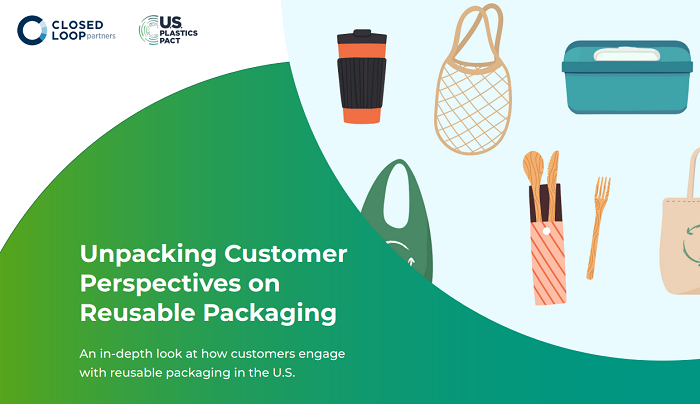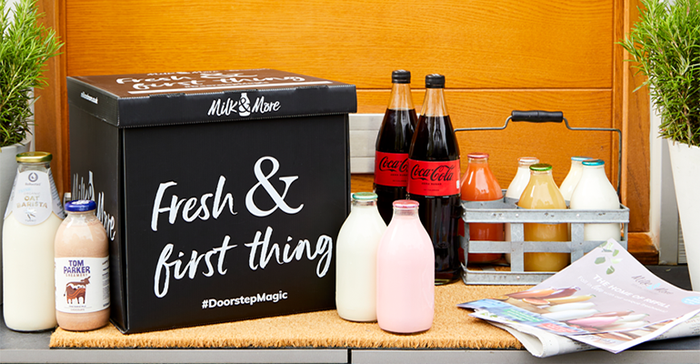A Deep Dive into Reusable Packaging in the US
U.S. Plastics Pact, Closed Loop Partners release first-of-its-kind report on consumer engagement with reusable packaging.

At a Glance
- U.S. Plastics Pact and Closed Loop Partners’ report focuses on understanding customer engagement with reusable packaging.
- Center for the Circular Economy has tested diverse reusable packaging solutions since 2018 with 16 innovators.
- The Center emphasizes achieving 90%+ return rates for successful adoption.
Reusable packaging, which is the subject of a major deep-dive report drawn from real-world examples, may be stepping from the wings into the sustainability spotlight.
Closed Loop Partners’ Center for the Circular Economy (“the Center”), in collaboration with the U.S. Plastics Pact, published on January 9 a first-of-its-kind report, Unpacking Customer Perspectives on Reusable Packaging. The 26-page report shares new insights on customer behavior toward reuse in the US. It seeks to understand customer attitudes, preferences, and behaviors around reusable and refillable packaging solutions to help companies, cities and other key stakeholders navigate the current reuse landscape.
To effectively address the global plastics waste challenge, the US needs to develop widespread adoption of reuse systems.
Reusable solutions tested in retail stores and restaurants.
Since 2018, the Center for the Circular Economy has been testing diverse reusable packaging solutions in retail stores and restaurants. The Center’s Reuse Insights Lab conducts qualitative and quantitative research and data analytics through in-market testing, focus groups and customer interviews, to identify how to design and build the architecture for a reuse system that brings the circular economy to the forefront in our everyday life.
In 2023, the Center’s Reuse Insights Lab collaborated with the U.S. Plastics Pact, engaging the customer bases of 16 innovators participating in the U.S. Plastics Pact’s Reuse Catalyst Program.
The list of 16 innovators is a robust one. For example, the first four companies identified in the alpha-order listing are…
99Bridges: provides a sustainability software platform called Mosaic that enables full lifecycle tracking and management of reusable products like bags, cups and containers to maximize reuse, recirculation, and circularity.
Adrich: provides smart connected label technology to monitor container usage and automatically trigger refills for essential products, enabling brands to deliver refills and reduce single-use packaging.
Bound: offers a reusable origami inspired mailer that consumers can return through the mail for continued reuse, providing ecommerce with a sustainable packaging alternative to cardboard boxes.
Conscious Container: provides a refillable bottle washing service for the wine industry collecting, washing, and reselling excess wine bottles to enable reuse and refilling.

Reusable packaging innovators share what they do.
Based on surveys, interviews and an analysis of hundreds of customers using reusable packaging across the US, the study methodology focused on early adopter behavior. Rather than asking customers what they would do, we asked them what they already do. This avoids the “intention-action gap” that can occur when relying solely on sentiment instead of in-market behavior.
The report shares five key insights distilled from these real-world customer experiences:
Ongoing education and clear communication are vital to familiarize customers with reuse logistics and enable adoption on a larger scale;
Technology can simplify reuse tracking — particularly on the back end — but too many tech hurdles on the front end can overwhelm customers;
Thoughtful design choices that balance utility, sustainability and appeal are key for reuse systems to achieve their intended impact;
Choice and availability of reuse options help customers feel empowered to participate; and
Reuse solutions that meet customers where they are rather than demanding perfection are most likely to support long-term habit formation.
The Center emphasizes the critical role of achieving 90%+ return rates for successful reusable packaging adoption. This is vital for the environmental impact of reuse models. Despite customers being at various reuse journey stages, building habits takes time. As brands embrace reuse for sustainability, the report offers data-driven guidance on scaling reusable packaging. It explores customer perspectives and needs. Reuse systems are crucial for a circular economy, but sustainable scaling requires seamless integration into lifestyles. By sharing feedback from early adopters, the report provides intelligence on optimizing participation and making reuse an everyday reality for both public and private institutions.
“We’ve reached a crucial moment to make reusable packaging a normal part of everyday life,” says Kate Daly, managing director of Closed Loop Partners’ Center for the Circular Economy. “The research in this report charts a course toward transforming reuse by starting from the customer’s point of view—understanding and overcoming the obstacles people face that stop them from developing a habit of reusing.”
Emily Tipaldo, Executive Director of the U.S. Plastics Pact, underscores that, “If businesses and organizations can collaborate to deliver reusable options that truly fit into customers’ lifestyles, reuse can shift from occasional to habitual.”
In the coming year, Closed Loop Partners will release additional insights that build on this research, as part of an ongoing initiative to accelerate the transition to scalable and durable reusable packaging systems across the US.
For more information and examples, see these case studies of reusable packaging programs that include brand owners and retailers such as Coca-Cola, Unilever, Petco, Fred Meyers and others.

About the Author(s)
You May Also Like




